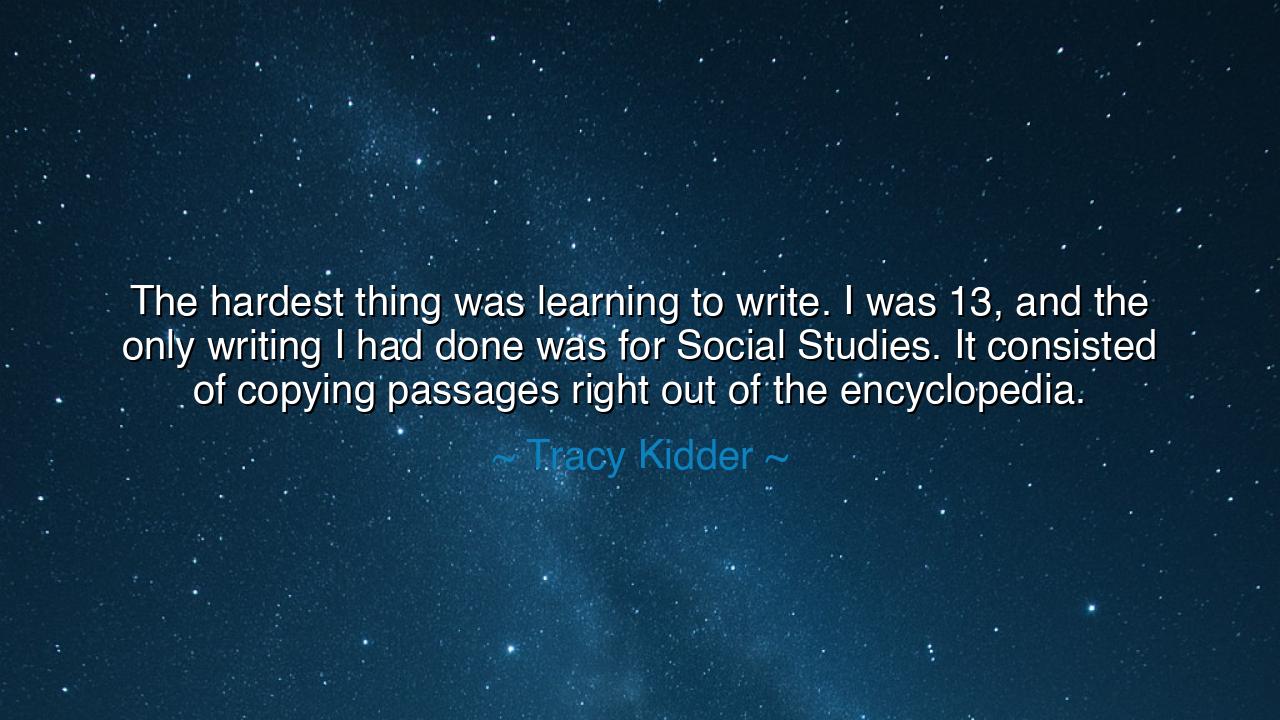
The hardest thing was learning to write. I was 13, and the only
The hardest thing was learning to write. I was 13, and the only writing I had done was for Social Studies. It consisted of copying passages right out of the encyclopedia.






Hear now the words of Tracy Kidder, who confessed with both humility and strength: “The hardest thing was learning to write. I was 13, and the only writing I had done was for Social Studies. It consisted of copying passages right out of the encyclopedia.” In this confession lies a truth that echoes across the ages: that the art of writing is not merely the act of placing words on a page, but the struggle of discovering one’s own voice. It is the hardest thing because it demands not only skill of the hand, but courage of the soul.
When Kidder recalls the age of thirteen, he speaks of a time of innocence and imitation, when the young mind, untrained, borrows the words of others rather than forging its own. To copy from the encyclopedia was not laziness, but the natural step of one who has not yet learned that true writing is creation, not repetition. It is the movement from echoing the world to speaking into it. This is why learning to write is difficult—it requires leaving the safety of authority and daring to give shape to one’s own thoughts.
This struggle is not his alone, but universal. Recall the story of Socrates, who claimed to write nothing, for he feared the written word might capture truth imperfectly. Yet his student Plato, braver in this regard, wrestled with words to give eternal form to the thoughts of his teacher. Even Plato, at first, was but a copier of dialogues, until in time he shaped philosophy itself into enduring works. So too does every writer begin in imitation and only later, through struggle, carve a voice that is distinctly their own.
To say “the hardest thing was learning to write” is also to say that writing is more than letters on parchment—it is a mirror held up to the mind. It demands clarity, patience, honesty, and discipline. A careless pen exposes a careless thought, just as a careful one illuminates the deepest truths. Writing is hard because thinking is hard. To learn to write is to learn to wrestle with the chaos of the inner world and bring forth order, meaning, and beauty.
History provides many examples of this sacred struggle. Consider Abraham Lincoln, who in his youth had little formal education and learned by copying passages from the Bible and Shakespeare. Yet in time, through relentless effort, he gave the world the Gettysburg Address—words so simple, yet so profound, that they endure like scripture. His journey mirrors Kidder’s: from copying to creating, from echoing the wisdom of others to finding a voice that shaped nations.
The lesson here is clear: do not be dismayed if the path of writing feels heavy and slow. Every master began as a beginner, every original voice once echoed the words of another. What matters is not how you begin, but that you persist. The hardest thing is also the most rewarding thing, for once you learn to write, you learn to see, to think, to live with deeper awareness. Writing is not only an art; it is a way of being.
Practical action flows from this wisdom. Read widely, but do not only copy—reflect, question, respond. Write daily, even if poorly, for practice is the forge in which the dull ore of thought becomes the bright steel of expression. Seek not only to impress, but to reveal truth. And above all, be patient with yourself, for the journey from imitation to creation is long, but it leads to freedom.
Thus, Kidder’s words, though spoken of childhood, ring with timeless meaning: that learning to write is the hardest thing, because it is the act of becoming fully human. It is the transformation of silence into speech, of imitation into originality, of thought into legacy. Let all generations remember: the writer’s struggle is not to be avoided, but embraced, for through it, one learns not only to write, but to truly live.






AAdministratorAdministrator
Welcome, honored guests. Please leave a comment, we will respond soon